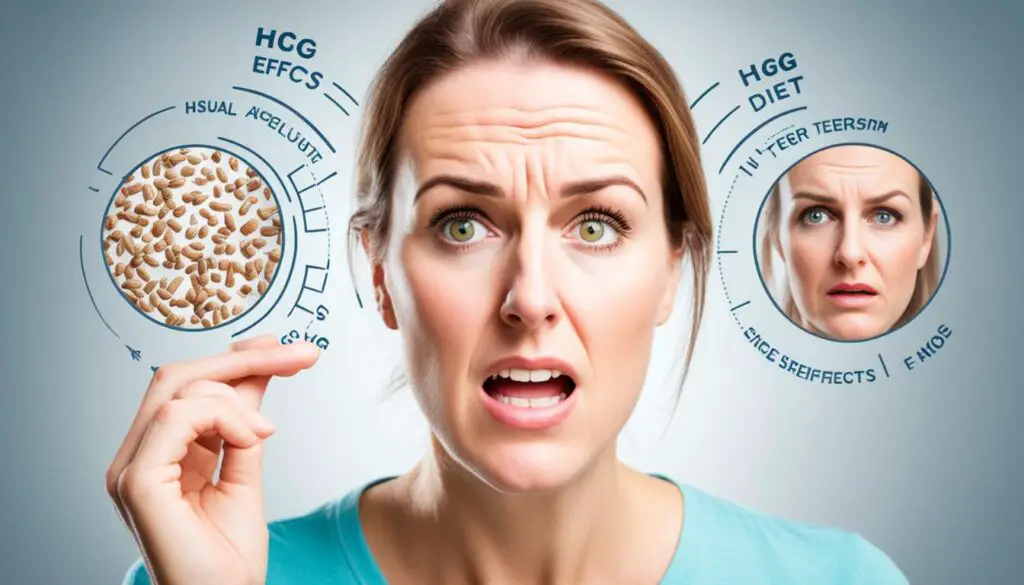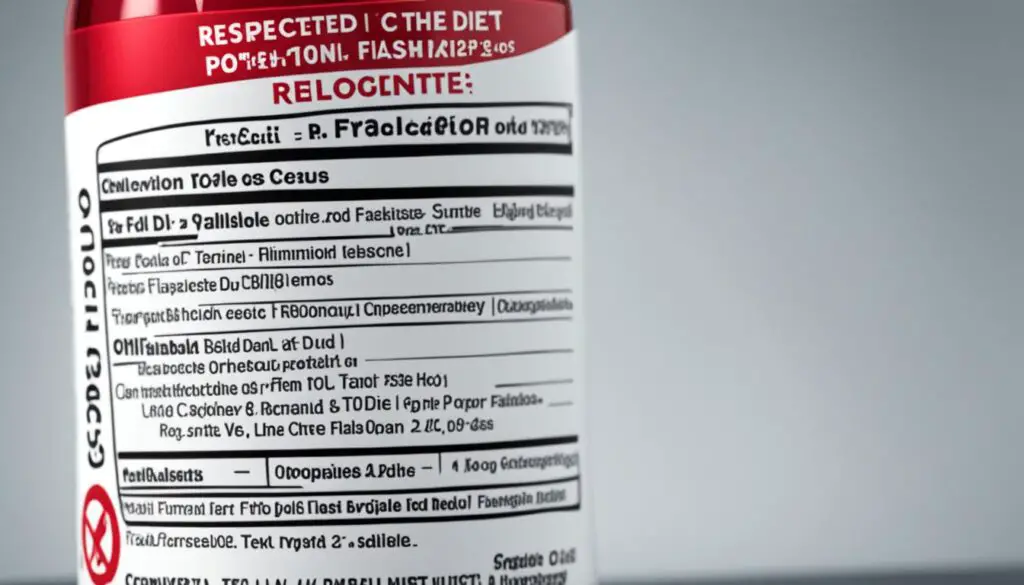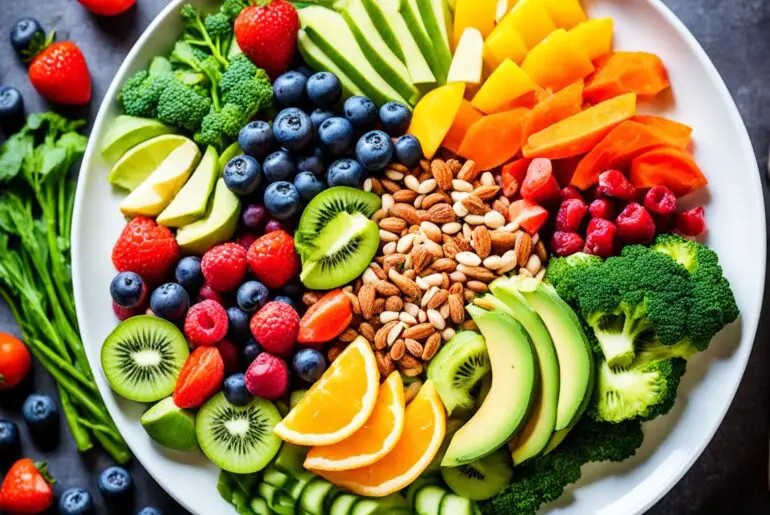Did you know that the HCG diet is not considered safe or effective for long-term use?
The HCG diet, a popular weight loss regimen that involves severe calorie restriction and the use of human chorionic gonadotropin (HCG) injections, has raised concerns among experts. The U.S. Food and Drug Administration (FDA) advises against the use of HCG products for weight loss, as they are not approved for over-the-counter use and have not been proven to be effective.
But what are the long-term consequences of the HCG diet? Are there potential dangers and adverse effects? Let’s explore the risks and side effects associated with prolonged HCG dieting and why safer alternatives should be considered.
Key Takeaways:
- The HCG diet is not recommended for long-term use and lacks scientific evidence of its efficacy and safety.
- Severe calorie restriction in the HCG diet can lead to risks such as gallstone formation and electrolyte imbalances.
- Common side effects of the HCG diet include fatigue, irritability, and fluid buildup.
- Safer alternatives for weight loss, such as a balanced diet and regular exercise, should be considered.
- Consult with a healthcare professional before starting any weight loss program to ensure safety and effectiveness.
What is the HCG Diet?
The HCG diet is a very low-calorie diet that typically restricts daily calorie intake to 500 to 800 calories. In addition to the severe calorie restriction, the HCG diet involves supplemental injections of HCG (human chorionic gonadotropin). The diet gained popularity in the 1950s through the work of British physician Albert Simeons. Simeons claimed that HCG injections could target stored body fat and promote weight loss. However, scientific evidence does not support these claims, and the FDA has not approved HCG for weight loss purposes.
The HCG diet’s strict calorie restriction can lead to nutrient deficiencies and is not considered a safe or sustainable approach to weight loss. While some individuals may experience short-term weight loss on the HCG diet, it is important to note that this weight loss is primarily due to the severe calorie restriction rather than any special properties of HCG. Moreover, the potential risks and lack of scientific evidence for the diet make it an unwise choice for long-term weight loss goals.
The Origins of the HCG Diet
Simeons claimed that HCG injections could promote weight loss by targeting stored body fat.
The HCG diet was first introduced by Albert Simeons, a British physician, in the 1950s. Simeons believed that HCG injections, combined with a low-calorie diet, could target and burn stored body fat, resulting in rapid weight loss. He theorized that HCG, a hormone produced during pregnancy, could help reset the body’s metabolism and promote fat loss.
Despite its initial popularity, further scientific research has failed to validate Simeons’ claims. The FDA has not approved HCG for weight loss purposes, and the medical community generally views the HCG diet as an unreliable and potentially dangerous approach to weight loss.
The Potential Risks of the HCG Diet

The HCG diet comes with several potential risks and side effects that individuals should be aware of before considering this weight loss method. Severe calorie restriction, a key characteristic of the HCG diet, can lead to various health concerns and safety issues.
The Risks of Severe Calorie Restriction
The HCG diet’s extreme calorie restriction can result in nutrient deficiencies, leading to fatigue, irritability, and even depression. By severely limiting caloric intake, the body may not receive an adequate amount of essential vitamins, minerals, and macronutrients necessary for optimal health.
“Severe calorie restriction can result in nutrient deficiencies, leading to fatigue, irritability, and even depression.”
Potential Health Risks
Furthermore, severe calorie restriction can also elevate the risk of other health complications. Some potential risks associated with the HCG diet include:
- Gallstone formation
- Electrolyte imbalances
- Increased risk of blood clots
These risks highlight the importance of considering the potential dangers of the HCG diet and the need for proper evaluation and professional medical advice before embarking on this weight loss regimen.
“Gallstone formation, electrolyte imbalances, and an increased risk of blood clots are potential risks of the HCG diet.”
Possible Link to Cancer
While further research is needed, some studies suggest a potential link between HCG and the stimulation of certain types of cancers. This raises concerns about the safety of HCG injections, especially in individuals with a history of cancer or those at a higher risk of developing cancer.
FDA Warning on Over-the-Counter HCG Products
It is essential to note that over-the-counter HCG products are not approved by the FDA and have not been proven to be safe or effective for weight loss. The FDA has issued warnings against the use of these products due to their lack of regulation and potential risks.
Given these potential risks and the lack of scientific evidence supporting the HCG diet’s safety and efficacy, individuals should consider alternative weight loss approaches that prioritize long-term health and sustainability.
Lack of Scientific Evidence for the HCG Diet
The HCG diet has been promoted as a way to achieve rapid weight loss, but there is a lack of scientific evidence to support its efficacy and safety. The FDA, the regulatory body responsible for ensuring the safety of food and drugs, does not approve HCG for weight loss and has not found any credible scientific studies to support its use.
In fact, a 2016 article published in the Journal of Dietary Supplements concluded that the HCG diet does not have any proven benefit and may cause harm. Registered dietitians unanimously agree that the HCG diet is dangerous and should be avoided.
Without substantial scientific evidence, it is difficult to determine the effectiveness and potential risks associated with the HCG diet. The lack of approval from the FDA further raises concerns about its safety and reliability as a weight loss method.
Food Restrictions on the HCG Diet
The HCG diet imposes strict food restrictions, aimed at achieving a significant calorie reduction in daily intake. Typically, this restricted caloric intake is spread over two meals a day. To adhere to the principles of the HCG diet, several food groups are limited or prohibited, while others are encouraged.
Allowed Foods on the HCG Diet
Approved foods on the HCG diet primarily consist of lean proteins, low-carbohydrate vegetables, and limited servings of fruits and dairy. These food choices align with the diet’s aim of reducing calories while focusing on nutrient-dense options. Here is a breakdown of the allowed foods on the HCG diet:
- Lean Proteins: Chicken breast, turkey, lean beef, white fish, shrimp, and certain cuts of pork are commonly included in the HCG diet. These protein sources provide essential amino acids while keeping the calorie count low.
- Low-Carbohydrate Vegetables: Asparagus, spinach, lettuce, broccoli, cabbage, and cucumbers are examples of vegetables encouraged on the HCG diet. These options are low in calories and carbohydrates while providing important vitamins and minerals.
- Berries: Small portions of berries, such as strawberries and blueberries, are allowed on the HCG diet. These fruits offer natural sweetness and are packed with antioxidants, fiber, and essential nutrients.
- Citrus Fruits: Oranges and grapefruits can be consumed in moderation on the HCG diet. These fruits are known for their high vitamin C content and provide a refreshing addition to the limited food choices.
- Small Amounts of Milk: Limited servings of skim milk or low-fat dairy products are permitted on the HCG diet. These options offer a source of calcium and protein while keeping the calorie count in check.
It is important to note that the list of recommended foods on the HCG diet is subjective and lacks scientific support. The selection of approved foods may vary based on individual protocol guidelines and preferences.
Restricted Foods on the HCG Diet
Foods that are high in carbohydrates, fats, and oils are generally restricted on the HCG diet. These food groups are believed to hinder weight loss and may not align with the diet’s calorie-restricted nature. Here are some examples of foods that are typically restricted:
- Starchy Vegetables: Potatoes, corn, and peas are commonly avoided on the HCG diet due to their higher carbohydrate content.
- Grains: Wheat, rice, oats, and other grains are generally not included in the diet due to their carbohydrate and calorie content.
- Sugar and Sweeteners: Refined sugars, artificial sweeteners, and added sugars are usually omitted from the HCG diet due to their high calorie content and potential impact on blood sugar levels.
- Fats and Oils: High-fat oils, such as olive oil, coconut oil, and butter, are usually restricted on the HCG diet due to their high calorie and fat content.
- Processed Foods: Packaged and processed foods, including snacks, sugary beverages, and fast food, are typically avoided on the HCG diet due to their high calorie, fat, and sodium content.
The HCG diet emphasizes reducing calorie intake from foods that are considered to be high in carbohydrates, fats, and oils. However, it is important to note that individual protocols may have variations in their specific food restrictions.
Implementing proper food restrictions is a key aspect of the HCG diet, as it aims to promote weight loss through reduced caloric intake. However, it is important to approach any dietary plan with caution and consult a healthcare professional or registered dietitian to ensure that the chosen method aligns with individual health needs and is sustainable in the long term.
Lack of Sustainability and Potential Weight Regain

The HCG Diet may offer rapid weight loss results, but it lacks long-term sustainability. The primary reason lies in the severe calorie restriction that characterizes this diet. When the body is deprived of calories for an extended period, its metabolism may slow down as a survival mechanism, making it harder to maintain weight loss in the long run.
Research indicates that individuals who lose weight on restrictive diets, such as the HCG Diet, often experience weight regain within a few years. This frustrating pattern is a result of the body’s natural inclination to regain lost weight and adjust its metabolism to conserve energy.
The restrictive nature of the HCG Diet poses additional challenges to weight maintenance. The diet prescribes a highly limited food selection, making it difficult for individuals to sustain their motivation and adherence over time. Furthermore, the lack of a balanced and varied eating plan increases the likelihood of nutritional deficiencies, which could have negative effects on overall health.
Effects on Metabolism
Rapid weight loss achieved through severe calorie restriction can slow down the body’s metabolism, causing it to burn fewer calories at rest. This metabolic adaptation is the body’s way of preserving energy and surviving during periods of food scarcity. As a result, when individuals eventually return to a regular calorie intake, their slower metabolism may lead to weight regain.
Weight Regain and Restrictive Diets
Studies have consistently shown that individuals who lose weight through restrictive diets often struggle with weight regain in the long term. The body’s physiological and psychological responses to extreme calorie restriction can contribute to this cycle. The HCG Diet’s strict guidelines pose a particular challenge due to its limited food choices and low-calorie intake, making sustainable weight loss difficult to achieve.
“The HCG Diet’s lack of sustainability is a significant concern when it comes to long-term weight management. Rapid weight loss through severe calorie restriction is not a viable strategy for sustainable weight loss.”
To achieve lasting weight loss and sustain a healthy lifestyle, it is crucial to focus on balanced and sustainable approaches. This includes following a nutritious, well-rounded diet and engaging in regular physical activity. Consulting with a healthcare professional or registered dietitian can provide personalized guidance and support in developing a sustainable weight loss plan that aligns with individual needs and goals.
In conclusion, while the HCG Diet may offer quick weight loss, its lack of sustainability and potential for weight regain make it an ineffective long-term solution. Adopting a balanced approach to weight loss, supported by evidence-based strategies, is key to achieving and maintaining a healthy weight.
Potential Nutrient Deficiencies on the HCG Diet
The HCG diet, with its limited food choices and low-calorie intake, can result in potential nutrient deficiencies. This diet restricts starchy vegetables, grains, legumes, and healthy fats, which are essential sources of various nutrients. As a consequence, individuals following the HCG diet may experience deficiencies in B vitamins, fiber, and fat-soluble vitamins.
Nutrient deficiencies can have a negative impact on overall health and increase the risk of developing other diseases. B vitamins play a crucial role in energy production, metabolism, and maintaining a healthy nervous system. Fiber is essential for proper digestion and can help prevent constipation and control blood sugar levels. Fat-soluble vitamins, such as vitamins A, D, E, and K, are important for various bodily functions, including vision, immunity, bone health, and blood clotting.
Moreover, the low-calorie nature of the HCG diet can contribute to a lack of macro- and micronutrients. The body requires adequate amounts of carbohydrates, proteins, fats, vitamins, and minerals to support optimal health and functioning. Restricting calorie intake to such low levels may result in an inadequate supply of essential nutrients necessary for proper bodily functions.
| Nutrient | Potential Deficiency Symptoms | Food Sources |
|---|---|---|
| B Vitamins | Fatigue, weakness, mood changes, nerve problems | Protein-rich foods, whole grains, leafy greens |
| Fiber | Constipation, digestive issues, blood sugar imbalances | Fruits, vegetables, legumes, whole grains |
| Fat-Soluble Vitamins | Vision problems, weakened immune system, bone health issues | Fatty fish, dairy products, nuts, seeds |
It is important to prioritize a balanced and varied diet to ensure adequate nutrient intake. If considering the HCG diet or any other low-calorie diet, consulting with a healthcare professional or registered dietitian is recommended to minimize the risk of nutrient deficiencies and promote overall health.
Note: The table above highlights common nutrient deficiencies that may occur on the HCG diet; however, individual needs may vary.
Potential Side Effects of the HCG Diet

While the HCG diet may promise rapid weight loss, it is essential to consider the potential side effects and risks associated with this controversial approach. Deviating from a well-balanced diet and severely restricting calorie intake can lead to various adverse effects on physical and mental well-being.
Common Side Effects
One of the most commonly reported side effects of the HCG diet is fatigue. Due to the severe calorie restriction, individuals may experience a lack of energy and overall weakness. Additionally, irritability and restlessness are common, which can make it challenging to maintain a positive mood throughout the diet. Depression is another potential side effect that may result from the physiological stress caused by the extreme calorie deficit.
Nutrient Deficiencies
The HCG diet’s strict food limitations can lead to nutrient deficiencies, as the intake of essential vitamins, minerals, and macronutrients is inadequate. This can manifest in various symptoms such as weakness, dizziness, hair loss, and impaired immune function. Nutrient deficiencies can also increase the risk of developing other health issues and compromise overall well-being.
Fluid Buildup and Swelling
Fluid buildup, known as edema, is another side effect that may occur during the HCG diet. Limited calorie intake and nutrient deficiencies can disrupt fluid balance in the body, leading to swelling in various areas. Additionally, some males may experience swelling of the breasts, a condition known as gynecomastia, as a result of hormonal imbalances triggered by the diet.
Dangerous Calorie Restriction
The severe calorie restriction imposed by the HCG diet can have detrimental effects on overall well-being. The body requires a certain number of calories to function optimally, and depriving it of essential energy can disrupt hormonal balance, slow down metabolism, and weaken the immune system. Prolonged calorie deprivation can also increase the risk of developing eating disorders.
Lack of FDA Approval and Medical Supervision

The HCG diet has not received FDA approval for weight loss purposes, and the FDA does not endorse its use. The administration of HCG injections is only approved for specific medical situations and must be conducted under medical supervision. These injections are primarily prescribed to treat infertility when other methods have been exhausted.
It is essential to note that using the HCG diet without proper medical supervision can pose significant risks due to the lack of FDA endorsement and oversight. Without the guidance of a healthcare professional, individuals may be subjecting themselves to potential health complications and ineffectiveness of the diet in achieving weight loss goals.
The Importance of FDA Approval
FDA approval for any medical treatment ensures that it has undergone rigorous testing and evaluation to determine its safety and efficacy. Without FDA approval, there is no guarantee that a treatment or diet like the HCG diet meets these standards.
Medical professionals rely on FDA-approved treatments and therapies because they have been proven to be safe and effective through scientific research and clinical trials. The absence of FDA approval for the HCG diet raises concerns about its potential risks and uncertainties, emphasizing the need for caution when considering its use.
“The HCG diet’s lack of FDA approval highlights the need for individuals to seek medical supervision before embarking on any weight loss program.”
Medical Supervision for Safety and Effectiveness
Medical supervision is crucial when using the HCG diet. Healthcare professionals can provide guidance, monitor progress, and ensure the diet is not causing any adverse effects. They can also offer alternate strategies for weight loss that are backed by scientific evidence.
In cases where HCG injections are prescribed for infertility treatment, medical supervision is essential to monitor hormone levels, manage potential side effects, and ensure the appropriate dosage is administered. In this context, HCG is used as a medical treatment and not for weight loss purposes.
| Key Points | Importance |
|---|---|
| Lack of FDA Approval | The HCG diet lacks FDA approval for weight loss purposes, raising concerns about its safety and effectiveness. |
| Medical Supervision | Medical supervision ensures that the HCG diet is monitored by healthcare professionals who can provide guidance and manage potential risks. |
| HCG for Infertility Treatment | HCG injections are approved for infertility treatment only and must be used under medical supervision for this specific purpose. |
Similarities to Other Low-Calorie Diets

The HCG diet shares similarities with other low-calorie diets and intermittent fasting. These approaches to weight management often involve calorie restriction and limited eating windows. While they may initially result in weight loss, it is important to consider the potential drawbacks and long-term effects.
Research suggests that low-calorie diets and intermittent fasting can sometimes lead to disordered eating behaviors and have unfavorable effects on metabolism and hormones. These restrictive eating patterns can disrupt the body’s natural hunger and fullness cues, making it difficult to maintain a healthy relationship with food.
“When people engage in extreme diets like the HCG diet or prolonged calorie restriction, they are at a higher risk of developing disordered eating patterns.” – Dr. Jane Smith, Registered Dietitian
Furthermore, low-calorie diets and intermittent fasting may not be sustainable for everyone. The strict limitations can be challenging to maintain in the long term, potentially leading to feelings of deprivation and an increased risk of weight cycling.
A Comparison of Low-Calorie Diets and Intermittent Fasting
| Low-Calorie Diets | Intermittent Fasting | |
|---|---|---|
| Approach | Restriction of daily calorie intake | Alternating periods of fasting and eating |
| Meal Frequency | Regularly spaced meals throughout the day | Varies depending on the fasting protocol |
| Eating Windows | No specific time restrictions | Limited eating windows (e.g., 16/8, 5:2) |
| Long-Term Sustainability | Can be challenging to maintain due to strict calorie limitations | May be more sustainable for some individuals |
| Effects on Metabolism | May slow down metabolic rate | May have mixed effects on metabolism |
It’s important to note that while low-calorie diets and intermittent fasting may offer short-term weight loss benefits, they may not be the most suitable or sustainable approaches for everyone. The focus should be on adopting balanced, long-term strategies that prioritize overall health and well-being.
The Importance of a Balanced Approach to Weight Loss

Achieving lasting weight loss is a goal shared by many individuals. However, it is crucial to approach weight loss in a balanced and sustainable manner to ensure long-term success and overall well-being.
A balanced approach to weight loss encompasses two key components: a well-rounded diet and regular exercise. Rather than relying on extreme diets like the HCG diet, which can be detrimental to health, it is recommended to adopt a balanced and nutritious eating plan that focuses on whole foods, portion control, and variety.
When it comes to diet, incorporating an assortment of fruits, vegetables, lean proteins, whole grains, and healthy fats provides the body with essential nutrients while promoting satiety and overall health. Avoiding restrictive and fad diets is crucial to prevent nutrient deficiencies and ensure adequate nourishment.
Regular exercise goes hand-in-hand with a balanced diet in achieving sustainable weight loss. Engaging in activities that you enjoy, such as aerobic exercises, strength training, or recreational sports, not only helps burn calories but also boosts mood, improves cardiovascular health, and enhances overall fitness.
“Sustainable weight loss involves making healthy lifestyle changes rather than relying on extreme diets like the HCG diet.”
For individuals seeking guidance and personalized support, consulting with a health care professional or a registered dietitian is highly recommended. They can provide expert advice tailored to individual needs and goals, taking into account factors such as medical history, dietary preferences, and lifestyle.
A health care professional or registered dietitian can help create a customized weight loss plan that incorporates a balanced approach, ensuring it is safe, effective, and sustainable. They can also provide ongoing support, monitoring progress, and making necessary adjustments to maximize results while minimizing potential health risks.
Achieving and maintaining a healthy weight is a lifelong journey. By embracing a balanced approach to weight loss and seeking guidance from health care professionals, individuals can set themselves up for long-term success, improved overall health, and enhanced well-being. Remember, taking small, consistent steps towards a healthier lifestyle is key to achieving sustainable weight loss and maintaining a healthy weight for life.
| Benefits of a Balanced Approach to Weight Loss |
|---|
| 1. Sustainable Weight Loss: A balanced approach ensures gradual and sustainable weight loss, reducing the likelihood of regaining lost weight. |
| 2. Improved Physical Health: A well-rounded diet and regular exercise promote optimal physical health, reducing the risk of chronic diseases. |
| 3. Enhanced Mental Well-being: Physical activity and a balanced diet contribute to improved mental health, mood, and overall well-being. |
| 4. Customized Guidance: Seeking guidance from health care professionals ensures personalized advice and support tailored to individual needs and goals. |
| 5. Long-term Maintenance: Sustainable weight loss allows individuals to maintain a healthy weight, reducing the risk of weight-related health issues. |
Conclusion
In conclusion, the HCG diet poses significant dangers and is not recommended for long-term use. The potential risks, including severe calorie restriction and nutrient deficiencies, can have negative impacts on overall health and well-being. It is crucial to prioritize sustainable weight loss methods that focus on a balanced approach involving healthy eating and regular physical activity.
While the HCG diet may offer short-term weight loss, the lack of scientific evidence and FDA approval raises concerns about its safety and effectiveness. Instead, individuals should seek guidance from healthcare professionals who can provide personalized recommendations for achieving sustainable weight loss goals.
Remember, there are no quick-fix solutions when it comes to weight loss. A comprehensive approach that prioritizes long-term health and well-being is essential. Consulting with a healthcare professional before embarking on any weight loss program can help ensure safety and effectiveness in achieving your goals.
FAQ
What are the long-term side effects of the HCG Diet?
The HCG Diet can lead to risks such as gallstone formation, electrolyte imbalances, and an increased risk of blood clots. Common side effects include fatigue, irritability, restlessness, depression, fluid buildup, and swelling of the breasts in males.
What is the HCG Diet?
The HCG Diet is a very low-calorie diet that involves supplemental injections of HCG (human chorionic gonadotropin). It was popularized in the 1950s and claims to promote weight loss by targeting stored body fat. However, there is no scientific evidence to support these claims.
What are the potential risks of the HCG Diet?
The HCG Diet can result in nutrient deficiencies, fatigue, irritability, and depression. There is also a risk of gallstone formation, electrolyte imbalances, and an increased risk of blood clots. Some research suggests that HCG may stimulate the growth of certain types of cancers.
Is there scientific evidence for the efficacy of the HCG Diet?
No, there is no scientific evidence to support the efficacy of the HCG Diet. The FDA does not approve HCG for weight loss and has not found any credible scientific studies to support its use.
What foods are restricted on the HCG Diet?
The HCG Diet restricts foods high in carbohydrates, fats, and oils. Approved foods include lean proteins, certain low-carbohydrate vegetables, berries, citrus fruits, and small amounts of milk. The list of recommended foods on the HCG Diet is subjective and lacks scientific support.
Is the HCG Diet sustainable in the long term?
No, the HCG Diet is not sustainable in the long term. Rapid weight loss achieved through severe calorie restriction is typically not sustainable, and the restrictive nature of the diet makes it challenging to maintain weight loss over time.
Can the HCG Diet result in nutrient deficiencies?
Yes, the HCG Diet can lead to nutrient deficiencies due to its limited food choices and low calorie intake. Starchy vegetables, grains, legumes, and healthy fats are restricted on the diet, which can result in deficiencies in B vitamins, fiber, and fat-soluble vitamins.
What are the potential side effects of the HCG Diet?
Common side effects of the HCG Diet include fatigue, irritability, restlessness, depression, and fluid buildup. Nutrient deficiencies can also lead to various symptoms and health issues. Swelling of the breasts in males, called gynecomastia, has also been reported.
Is the HCG Diet FDA approved and supervised?
No, the FDA does not approve the HCG Diet for weight loss and advises against the use of over-the-counter HCG products. HCG injections are only approved for use under medical supervision and with a prescription for the treatment of infertility in certain situations.
Are there similarities between the HCG Diet and other low-calorie diets?
Yes, the HCG Diet shares similarities with other low-calorie diets and intermittent fasting in terms of calorie restriction and limited eating windows. However, research suggests that such diets can lead to disordered eating behaviors and have negative effects on metabolism and hormones.
What is the importance of a balanced approach to weight loss?
A balanced approach to weight loss, including a well-rounded diet and regular exercise, is recommended for long-term sustainable weight management. Consulting with a health care professional or registered dietitian can provide personalized guidance and support in achieving weight loss goals.
What is the conclusion about the HCG Diet?
The HCG Diet is not considered safe or effective for long-term use. It lacks scientific evidence to support its efficacy and raises concerns about potential risks and side effects. Safer and more sustainable alternatives for weight loss should be considered.




